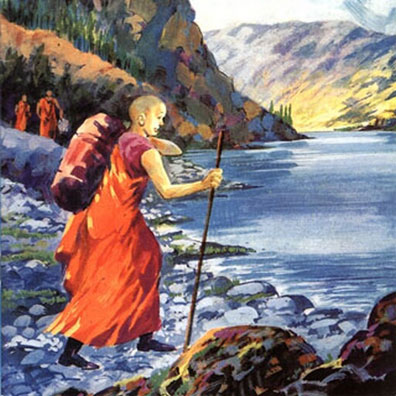|
MUSINGS:
A tantalizing tale
by Padma Edirisinghe
The tantalizing tale is that of a traveller, a robed one and a
Chinese. As you have already guessed his name is Fa-Hien who came all
the way from the distant Cathay empire via India to Sri Lanka in search
of the invaluable Dhamma books, specially those encoding Vinaya
precepts. What makes his travel tale tantalizing is that at the time he
ventured forth ie. the 4th and 5th centuries, the world was much younger
and minus any travel and writing facilities.
Overland
|

Fa-hien
pic. samvaadbhartipost.com |
The route he took is just mind-boggling. Starting from China he had
travelled overland to India via the Gobi desert across the Himalayas and
the terrain what is known as Nepal now, and came to our island from a
port in Bengal.
His writing materials were bamboo tablets and silk cloth and along
with keenness to travel and write, he was fired by piety too being a
devout follower of Sakyamuni.
First he had begun his journey with a few other monks who dropped out
one by one, as the journey grew hazardous.
Later he seemed to be a lone traveller, so lonely in a foreign land
that he had cried at the sight of a native pilgrim at A'Pura.
His religious zeal, specially the urge to find the books of Buddist
monks' disciplines that were sadly lacking in China, had egged him on to
wander forth , thus in solitude to India and then to Ceylon, braving
many an obstacle.
Challenge
From the beginning it was all a mighty challenge. Crossing the Gobi
desert, in the first stretch of the journey in itself had been a
nightmare.
Writes he, aided by the musicality of thought and words:
"There is not a bird to be seen in the air above nor an animal on the
ground below".
Finally the group reaches Kashmir where prevails Hinayana Buddhism.
They also drift on to further land permeated by Mahayana Buddhism.
Remember, this is a few centuries in the aftermath of Buddha's passing
away. Magadha itself that had flourished in Buddha's time had plummeted
to neglect.
Ten years they spend on either side of the Himalayas, "in the central
Buddhist realm".
They wade across Gaya and Benares and end up at Pataliputra (modern
Patna), learning Sanskrit and copying Vinaya monastic rules.
Gradually Fa-Hien's retinue seems to diminish for he now writes in
the singular, dropping the "WE".
Using the course of the river Ganges he arrives at the mouth of the
Hoogly, Tamluk by name where he copies out sutras and draws pictures of
images. Tamluk provides his departure point to Ceylon, probably all
alone.
Pleasant
"After 14 days and nights he came to the country of the Sinhala"
(writing in the 3rd person), 700 yojanas away from Tamaluk, he finds the
country extremely pleasant, with an active trade flourishing. Barter
trade of the Veddahs is mentioned, surprisingly sophisticated going by
the pricing system, a trade mentioned even in Pliny's account. Traders
flock to the environs, specially to a sea side port. This could be
Mannar. Foreign merchants including Chinese throng at Anuradhapura, a
city where he lived for 2 years. The Abhayagiri Dagoba and its monastery
are adulated, the latter housing 5,000 monks. The Hall of the Buddha
glistens with carved and inlaid works of gold and silver.
The city of Anradhapura itself had been in a grandiose state with
much facilities provided for Dhamma dissemination on the 8th, 14th and
15th of each month at spots where four roads meet. Here a loft dais is
constructed for preaching the dhamma, before which gather teeming crowds
to listen, reflecting how intensely the islanders had been.
There was a ceremony connected to the exposition of the Sacred Tooth
Relic that had become the palladium of the Sinhala nation ever since it
was brought from Kalinga (about 313 AD).
"This country has known neither famine nor rebellion," writes Fa-Hien,
however qualifying it with this phrase, "ever since this country has
been under civilized government!"
Yet he writes about a king who was subject to human frailty and
appropriated the priceless treasures in the keep of the monks. However
he repents later.
"He knocked his head on the ground in repentance of his former
transgression"! And goes further by imploring the monks not to let him
enter the treasury for probably there lies temptation"!
Strange
The most hazardous and tantalizing part of his journey had been
however his return journey after a stay in Lanka for two years. He was a
strange sight, loaded with a heap of books too that he had gathered in
the Abhayagiri monastery and whenever the ship that carried him tossed
and turned in the oceanic waters signalling a catastrophe the passengers
cried out that it was all caused by that strange man attired in yellow.
It was a hoodoo he carried. And they had been all agog to throw him and
the books to the sea but word got round that he was a Chinese. And they
were loth to anger the powerful emperor so that his life was saved.
Perhaps the Dhamma books he carried with such zeal shared the credit.
So finally he returned to his own land after a journey that took him
to nearly 30 "countries" according to his narrative and later that of
Hulugalle's. |

